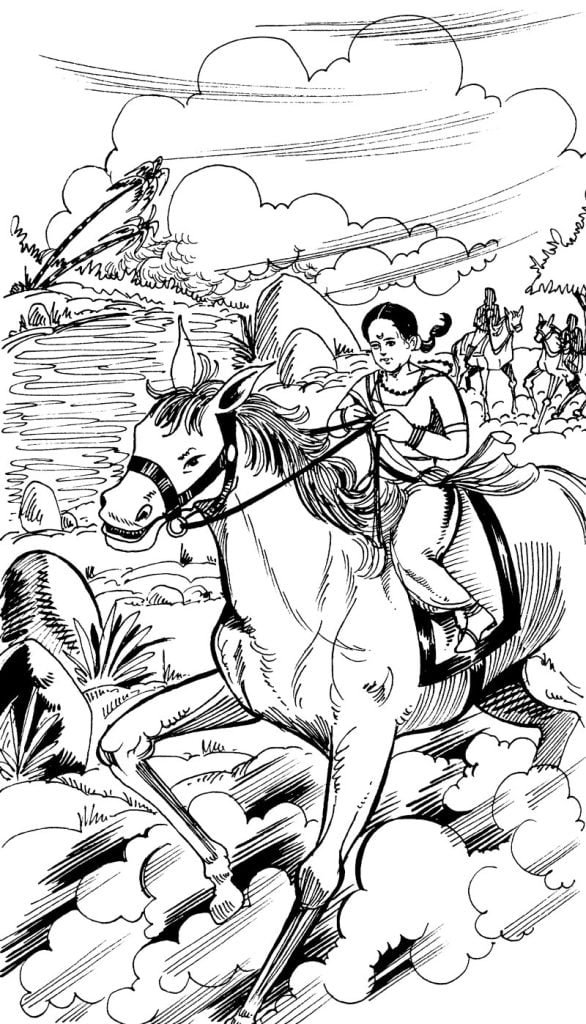In Maharashtra, there is a famous historical place named Satara. Chattrapati Shivaji’s guru Swami Ramdas’s Sajjangarh Math is located here and he used to live here only. Shivaji generally come here to meet Ramdas for his well-being and also for his consultation. Last Chattrapati Shahu had decided to hand over the whole power of Maratha Empire to Peshwa-I Balaji Vishwanath and thereafter to live peacefully in Satara. This way Satara had the prestige of beaming the capital of Maratha Empire. But here the prestige was only of name; the real centre was Pune where Peshwa used to live.
On the bank of Krishna river in Satara district, there is a small village named Wai. This village in the native place of Laxmibai’s ancestors. The ‘Tambe’ family used to live in this village. A member of this family named Krishna Rao had achieved a high reputation in Peshwa’s reign due to his talent and power. His son Balwant Rao was a brave man. Due to his extreme labour, he had acquired a high place in Maratha army. He had two sons—one was Moropant and the other was Sadashiv Rao. Moropant was the favourite of Chimnaji Appa, the brother of Peshwa Bajirao. He used to live under the shelter of Chimnaji in Pune.
In 1818, the Peshwa reign come to an end. Peshwa Bajirao had surrendered all his empire to British and accepted Rupees eight lac as pension. Thereafter he shifted to Bithur a place in Kanpur district. The British didn’t wanted a mess against them in Maharashtra due to an end of Peshwa reign, so they decided to put Chimanji on the Peshwa throne; thereby misguiding the people that Peshwa reign in still alive. They wanted to make Chimnaji a puppet Peshwa thereby keeping the whole authority in their hands.
But Chimnaji refused to obliged to their wishes. He clearly said that he doesn’t want to sit on the Peshwa throne. At last the British shifted him to Varanasi after giving him an annual pension of Rupees two lac. Chimnaji brought Moropant with him to Varanasi. Moropant had the responsibility on his shoulders and himself concentrated on worship and meditation. Moropant worked very honestly and faithfully. Both of them loved and trusted each-other very much.
BIRTH
Moropant’s wife was Bhagirathi Bai. She was a nobel, religious and faithful lady. She gave birth to a girl child on 19th November 1835. Both of them kept her name Mani Karnika. In Varanasi there is a famous ‘Ghat’ named Mani Karnika. The Hindus treated this Ghat to be very pious; so that must be the reason they kept her name Mani Karnika. But the people generally called her Manu with love. She was exceptionally beautiful and charming girl. This Manu later became famous in history as Rani Laxmibai.
The master of Moropant, Chimnaji Appa died in 1832. The government refused to give pension to his family members. This gave a big blow to Moropant. He became lonely and helpless and passed very difficult days in Varanasi after the death of Chimnaji. Atlast Peshwa Baji Rao decided to give him shelter in Bithur. Soon he came to Bithur with his family and started living here. Moropant won the heart as well as faith of Baji Rao with his morality, honesty and good nature and behaviour.
After few days living in Bithur, Moropant’s wife Bhagirathi Bai died. The whole responsibility of upbringing the girl came on the shoulder of Moropant. Now he had to fulfill the duties of both mother and father, and he accomplished it with full dedication. There was nobody to look after Manu in Moropant’s house. So he usually took her along with him to Baji Rao’s palace. Baji Rao was very attracted after seeing the beautiful and lively Manu. He liked her very much like his own daughter and started calling her Chabilee with love. Hence Chabilee became her popular name in Bithur and everybody called her with this name.
Manu used to play with Baji Rao’s adopted son Nana Saheb, Bala Saheb and grandson Rao Saheb. These were her childhood friends. She had developed manly quality due to playing with male friends right from her childhood. She was bold and courageous right from her childhood. Her studies were completed with them only. A teacher was appointed for Nana Saheb and Rao Saheb for their education. He gives them knowledge about alphabets. At that time Manu sits close to them and listens them carefully. Hence this way she also gained knowledge about alphabets. When Nana and his brother practice archery and shooting other arms, Manu used to watch them carefully. She also had learnt how to use swords, to set aim from gun and many other things. Very soon she became expert in the use of arms, in different exercises and also in swimming. Riding on horse was her favourite hobby. Right from her childhood she was full of self-respect and self-confidence. She never learnt to be perplexed with any type of situation. She was the true symbol of Boldness and Manliness.

Once Nana Saheb was going out for a ride on an elephant. Manu also wanted to sit on an elephant. She shouted and said to Nana about her desire; but Nana turned a deaf ear to her request and moved forward. This really touched her tender heart. Her father made her understood about their poor condition and said, “Riding on an elephant is not written in our fate.” This gave her severe blow and she was very disheartened, but soon she had developed a self-confidence within herself. She said—‘‘In my fate there is not one but many elephants.’’ It was like Manu’s tender mouth was speaking about her future. At this time three great warriors—Nana, Tatya and Manu were getting ready for expected rivalry.
